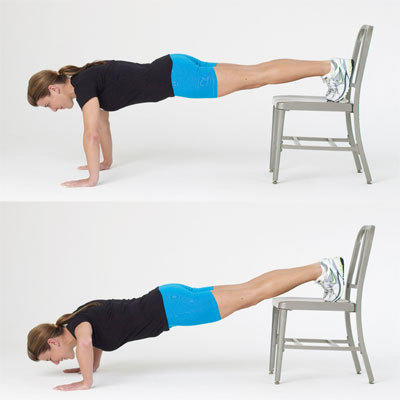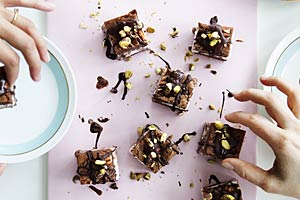Tips for a Fat Burning Diet
This is probably the most important tip of all. Almost all of us are guilty of consuming too little water. We need to remember that metabolism is a process that requires water. Water is necessary for proper isotonic balance of body fluids and also to help in transportation of waste products of metabolism. When we consume too little water the body tends to slow down metabolism simply because it cannot ensure an optimal metabolism and getting rid of waste products. Therefore the secret to unlocking metabolism starts with drinking enough water. As a general rule we should all consume at least 8 glasses of water a day.
All fruits except bananas. Your first day will consist of all the fruit you can eat except bananas. Cantaloupes and watermelons are lower in calories than most fruits. Eat your soup and fruit the first day, for drinks, unsweetened teas, cranberry juice and WATER.
All vegetables eat until you are stuffed with all the fresh, raw, or cooked vegetables of your choice. Try to eat leafy green veg and stay away from raw beans, peas and corn. Eat all the veg you can along within your soup. At dinner this day reward yourself with a big baked potato and butter. Eat all the vegetables you want this day but no fruit.
Those experts were taught (often very long ago) what's considered established dietetic or nutrition knowledge but what in fact are rather abstract ideas such as, for example the FDA food pyramid, having little if anything to stand on.
Excess sodium and sodium seasonings combined with fat can cause water retention. For males, it is most noticeable in the abdominal area. The thighs, hips, and buttocks are affected on females. But what causes these unwanted gains in weight and body fat? There are three possible reasons this can happen: (1) Eat late at night (2) Exceed your normal caloric intake (3) Lack of exercise or physical activity.
Speed up the metabolism is by increasing meal frequency. Instead of eating 2 - 3 meals per day, try eating 4 - 5 small meals per day, or 3 meals and 2 healthy snack meals. Food substitutions can help tremendously when trying to reduce calories and speed up the metabolism.
It has been proven that a diet moderate in highly fibrous carbs can increase insulin sensitivity in the muscle cells. Which is why we will stick with foods such as oatmeal, and fibrous green vegetables. The reason for this, is that your body will not overproduce insulin in response to these slow burning carbohydrates. Remember, the less fiber and the more processed the food you eat is, the more likely you are to cause an overproduction of insulin, because of how quickly the food is digested. If you continually do this, your muscle cells will become more and more resistant to the effects of insulin. However, the opposite also holds true. Your cells will become more and more sensitive when exposed to slower burning carbs.
Vitamin D has a main role in determining how the body manages energy, which directly involves fat metabolism. Unfortunately many of us do not eat enough Vitamin D. You can get your daily requirement of Vitamin D in a three and half ounce serving of salmon. Other great sources of Vitamin D are tofu, tuna, shrimp, fortified milk, cereal and eggs.
All fruits except bananas. Your first day will consist of all the fruit you can eat except bananas. Cantaloupes and watermelons are lower in calories than most fruits. Eat your soup and fruit the first day, for drinks, unsweetened teas, cranberry juice and WATER.
All vegetables eat until you are stuffed with all the fresh, raw, or cooked vegetables of your choice. Try to eat leafy green veg and stay away from raw beans, peas and corn. Eat all the veg you can along within your soup. At dinner this day reward yourself with a big baked potato and butter. Eat all the vegetables you want this day but no fruit.
Those experts were taught (often very long ago) what's considered established dietetic or nutrition knowledge but what in fact are rather abstract ideas such as, for example the FDA food pyramid, having little if anything to stand on.
Excess sodium and sodium seasonings combined with fat can cause water retention. For males, it is most noticeable in the abdominal area. The thighs, hips, and buttocks are affected on females. But what causes these unwanted gains in weight and body fat? There are three possible reasons this can happen: (1) Eat late at night (2) Exceed your normal caloric intake (3) Lack of exercise or physical activity.
Speed up the metabolism is by increasing meal frequency. Instead of eating 2 - 3 meals per day, try eating 4 - 5 small meals per day, or 3 meals and 2 healthy snack meals. Food substitutions can help tremendously when trying to reduce calories and speed up the metabolism.
It has been proven that a diet moderate in highly fibrous carbs can increase insulin sensitivity in the muscle cells. Which is why we will stick with foods such as oatmeal, and fibrous green vegetables. The reason for this, is that your body will not overproduce insulin in response to these slow burning carbohydrates. Remember, the less fiber and the more processed the food you eat is, the more likely you are to cause an overproduction of insulin, because of how quickly the food is digested. If you continually do this, your muscle cells will become more and more resistant to the effects of insulin. However, the opposite also holds true. Your cells will become more and more sensitive when exposed to slower burning carbs.
Vitamin D has a main role in determining how the body manages energy, which directly involves fat metabolism. Unfortunately many of us do not eat enough Vitamin D. You can get your daily requirement of Vitamin D in a three and half ounce serving of salmon. Other great sources of Vitamin D are tofu, tuna, shrimp, fortified milk, cereal and eggs.
Related Articles
-
Lose Weight with the Best Weight Loss Programs
Are you trying to lose weight? Sometimes weight loss can be diffic
-
Stress Eating & Unbearable Cravings
Its common to respond to stress by distracting yourself with your favo
-
Fat Burning Furnace - Have You Tried Short Burst Exercises that Lose Weight?
Fat Burning Furnace - Have You Tried Short Burst Exercises that Lose W
-
Cheat Your Way Thin Reviews - Cheat Your Way Thin Plan
Cheat Your Way Thin is the newest weight loss program on market. The p
-
Rob Poulos Fat Burning Furnace Scam
Rob Poulos, who has fought against his overweight since his childhood.
-
Unwanted Side Effects Caused By Weight-Loss Pills
All weight-loss solutions even exercises and supplements wi
- DON'T MISS
- Fat Burning Furnace - High Speed Weight Loss without Gimmicks Just Authentic Methods!
- Belly Fat Diet
- Positive aspects of Acai Berry
- Deciphering The Weight Loss Program Code
- Resveratrol: Drop Off Weight Naturally!!
- How To Start Losing Weight - 3 Essential Steps
- Laser Hair Removal Treatment in London Gets You Out of the Mess of Unwanted Hair
- How To Lose Fat And Not Muscle
- Is there a Difference between Resveratrol and Weight Loss Connection? Know The Truth
- Know How Graviola Extract Is Changing Many Individuals Lives




